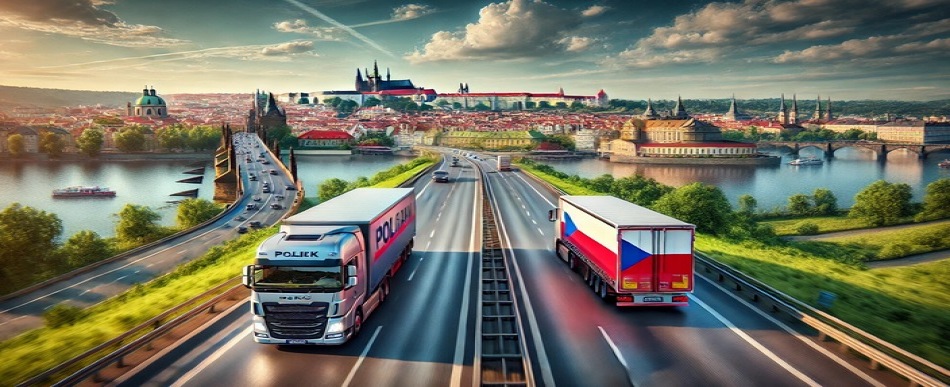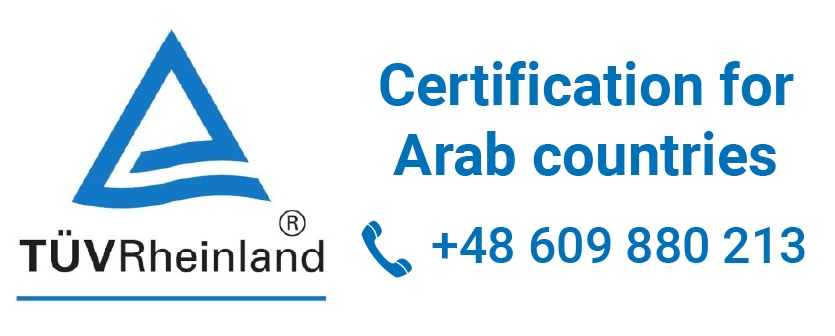Transport from and to the Czech Republic. Modern transport Poland-Czech Republic-Poland
Transport between Poland and the Czech Republic is a crucial component of international logistics and freight forwarding, supporting economic cooperation between the two neighboring countries. In trade relations, international transport Poland-Czech Republic and logistics Poland-Czech Republic play an important role in ensuring the efficient flow of goods and fostering business development in both countries. In trade relations, road freight transport plays a key role in facilitating the rapid and efficient delivery of goods between Poland and the Czech Republic.
Transport services on this route include the transportation of goods for various industries, such as automotive, food, fashion, chemicals, gaming, pharmaceuticals, and agricultural products, making the transport offering highly versatile. Companies offering transport to the Czech Republic provide comprehensive logistical services, ensuring safety, timeliness, and quality of transport, which is especially important in supply chains for demanding sectors of the economy.
Transport to the Czech Republic is carried out using modern vehicle fleets, tailored to carry goods of various sizes and requirements. Depending on the type of cargo, refrigerated trucks are used for goods requiring temperature control, delivery vans for quick shipments of smaller loads, and specialized vehicles for the transport of oversized cargo. Each of these vehicles ensures optimal transport conditions and cargo safety. Companies specializing in Czech Republic-Poland transport offer both full truckload and less-than-truckload services, which helps optimize costs and tailor services to customer needs. Highways such as D1, D5, and D11 are key communication routes, enabling fast and smooth transport. Transport companies to the Czech Republic also offer support with customs procedures, warehousing, and customizing services to meet individual needs.
The transport of fresh food products requires proper refrigeration conditions, and the transport of oversized cargo involves careful route planning and logistics organization. Cooperation between Polish and Czech transport companies enables top-level delivery, which supports the growth of international trade.
Transport Czech Republic-Poland-Czech Republic is a service aimed at companies requiring regular deliveries between the two countries, often referred to as regular Poland-Czech Republic transport or cyclical international transport. An experienced team of forwarders and advanced technologies, such as GPS tracking, allow real-time shipment monitoring and route optimization. Czech Republic-Poland transport is especially important for industries like automotive, chemical, and food, where timely deliveries and quality of transport are top priorities.
Transport to the Czech Republic covers major industrial regions such as Prague, Brno, Ostrava, and Plzeň, as well as other important economic centers in the Czech Republic. Shipments between Poland and the Czech Republic support dynamic trade exchanges, enabling businesses to thrive both domestically and internationally.
Transport from Poland to the Czech Republic and Czech Republic-Poland transport is mainly done by road transport, which plays a crucial role in international logistics. However, alternative transport forms such as rail freight are also gaining importance, particularly for bulk shipments and goods requiring long-distance transport. Rail transport is valued for its eco-friendliness, ability to carry large quantities of goods at once, and stable pricing compared to road transport.
Polish transport companies, in the framework of trade exchange, handle the transport of various products reflecting the high level of technological and economic development in Poland. These include construction materials, such as cement, concrete, prefabricated elements, and various finishing materials, widely used in the Czech construction industry. Other products include advanced medical equipment and diagnostic tools that support the development of the Czech healthcare sector and enhance medical care standards.
Frequently transported goods include industrial products such as iron, steel, machinery, and mechanical devices. A significant area of trade is also food products, including dairy, meat, sausages, and fruit and vegetable preserves. Transport to the Czech Republic also includes chemical products, such as fertilizers and plastics, as well as electronics and home appliances, which are in high demand in the Czech market. The automotive industry also plays a key role, supplying vehicles and auto parts to Czech consumers.
In the reverse direction, in the framework of import from the Czech Republic to Poland, Polish and Czech transport companies handle the delivery of high value-added products, such as advanced technologies used in industry, high-quality automotive components, and innovative electronic products that support the development of modern technological solutions in Poland. Major products imported from the Czech Republic include cars and automotive components, which are a significant part of the trade exchange between these countries. Poland also imports electronics such as televisions, smartphones, and computers, as well as industrial machines used in various sectors of the economy.
In the chemical products category, cosmetics, cleaning agents, and industrial chemicals dominate. A key element of imports is also Czech food products, including beer from the Czech Republic, which is world-famous, dairy products, and sweets highly appreciated by Polish consumers. This trade exchange strengthens economic cooperation and contributes to the growth of prosperity in both countries.
Transport to the Czech Republic and Czech Republic-Poland transport are supported by innovative technologies and modern logistics management systems, such as TMS (Transport Management System) and GPS tracking, which allow real-time monitoring of shipments and route optimization. Thanks to these solutions, shipments to the Czech Republic become more efficient, and cargo safety is at the highest level.
In the Czech Republic, there are specific regulations regarding speed limits for heavy vehicles, which are adapted to the type of road and vehicle. On highways, the maximum allowed speed for heavy vehicles is usually 80 km/h, while for passenger vehicles, it is 130 km/h. On express roads and primary roads, the speed limit for trucks is 80 km/h, and for other roads, such as secondary roads, the permissible speed is 60 km/h. In cities and built-up areas, the speed limit for trucks is 50 km/h, and in some places, especially in high-traffic areas, lower speed limits may apply. Additionally, in mountainous areas and regions with challenging road conditions, such as narrow or winding stretches, stricter speed limits may be enforced to ensure the safety of both truck drivers and other road users. These limits are strictly monitored, and violations carry heavy fines and legal consequences.
In the Czech Republic, heavy vehicle regulations include a variety of restrictions aimed at ensuring both road safety and environmental protection, as well as efficient traffic management on national roads. One of the key aspects is the road toll for vehicles over 3.5 tons. The toll system, known as “myto”, is based on an electronic toll collection system that is mandatory on highways, express roads, and selected sections of national roads. The toll amount depends on the vehicle's weight, number of axles, and type of road being used. Heavy vehicles must be equipped with a device to register passage and toll charges.
Moreover, there are days when heavy vehicle traffic is completely prohibited. These restrictions most commonly occur on weekends and public holidays, especially in the summer when traffic is heavy. The bans typically apply on Saturdays and Sundays, especially in the morning and afternoon hours, and on other holidays. During these times, trucks exceeding a certain weight (usually over 7.5 tons) are prohibited from using main roads and highways during certain hours to reduce congestion and improve travel comfort for other road users.
Additionally, many cities in the Czech Republic have implemented restricted access zones for heavy vehicles. These zones prohibit trucks above a certain weight or load capacity, particularly in the central parts of cities. This means that trucks must use bypasses or special transport roads to avoid issues with parking, noise, or air pollution.
Another noteworthy regulation concerns over-dimensional transport. For the transport of cargo exceeding permissible dimensions or weight, carriers must obtain special permits. These shipments are strictly controlled, and the route and travel dates must be coordinated with the appropriate road services. Pilot vehicles may also be required to ensure safe passage through narrow or challenging road sections.
Attention should also be paid to emissions regulations. In the Czech Republic, emission standards restrict the entry of older vehicles that do not meet specified emission standards into cities. These vehicles must meet Euro 4 or higher standards to enter areas with enhanced environmental protection. The goal of these regulations is to reduce air pollution, especially in larger urban areas.
As for general safety rules, the Czech Republic requires that all heavy vehicles be equipped with proper safety elements, including functional brakes, lighting, and signaling devices. Road inspections are frequent, and carriers must have the appropriate documents, including transport permits, technical inspection certificates, and proof of toll payment.
All these regulations aim to create an eco-friendly and efficient transport system in Europe, minimizing environmental impact, ensuring smooth traffic flow, and enhancing road safety.

 pl
pl  en
en  de
de  es
es  fr
fr  it
it  pt
pt  ru
ru  sv
sv 
















